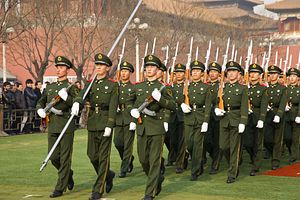[Editors Note: This post contains some spoilers for Ghost Fleet.]
In their acclaimed novel Ghost Fleet, Peter Singer and August Cole want to get us into the action as quickly as possible without mucking around the political and strategic origins of conflict. In a sense, they commit fully to an idea, first attributed to Thucydides, that the dynamics of the international system make conflict inevitable, and that the details of why states go to war are incidental.
In the real world, and in the best war fiction, nations tend to need reasons to go to war. These reasons have an impact on the course of the war; they affect operational objectives, the limits of escalation, the degree of mobilization, and the extent of will necessary to conducting the war.
I read Ghost Fleet, and I have no idea why China went to war against the United States. I have no idea why Russia joined China in this war. The main Russian characters in the war share my befuddlement; they don’t know why they’re fighting, and one is so bored of the war that he’d prefer to cosplay CSI: Honolulu.
I don’t know why the Chinese government would want war. I don’t even know what the Chinese government IS; the “Directorate” is some kind of odd creature that had managed to render moot all of the domestic and bureaucratic conflicts that have afflicted China (and every other state, civilization, and local PTA) since the beginning of time.
The Directorate has no specific grievance against the United States, seeks to exploit no particular window of vulnerability (China, despite having an economy more exposed to international trade fluctuations than the U.S., appears to enjoy uninterrupted growth while the U.S. falters), and answer no clear domestic call for action. The closest hint to a logic of war is (spoiler) the sudden availability of a means for detecting American submarines from space.
Indeed, the entire war is built on a mcguffin; the unbelievable notion that Russia and China could work out the details of operational (not merely strategic) collaboration without U.S. intelligence getting even a sniff of what was going on. Singer and Cole don’t tell us about the plague has run through the U.S. think tank community and taken out every analyst who’s dedicated his career to overhyping the Russian and Chinese threat, but it’s the only plausible explanation. And it’s hardly surprising that the Russians and Chinese do well, given that they can exploit all of the political and bureaucratic perversities present in the U.S. system of governance, yet apparently suffer none of their own.
This leaves Ghost Fleet devoid of any strategic or political logic beyond “two big guys gonna fight.” And this makes it less a novel than a series of tactical vignettes, detached from any broader strategic logic. To be sure, many of these vignettes do their jobs on both the “techno” and the “thriller” sides, but they remain no more than thumbnail sketches with respect to what we could expect in a broader conflict between China and the United States.
And this leads to the biggest problem with Ghost Fleet. Technology has an important influence on the nature and course of warfare. But if we’ve learned anything from the renaissance in security and strategic studies over the past decade, it’s that technology matters in context of national and organizational strategies, which themselves have extraordinarily complex origins. Trying to write about the influence of technology on warfare while detaching that influence from plausible accounts of how nations, groups, and organizations function, only guarantees that you’ll get it wrong.

































